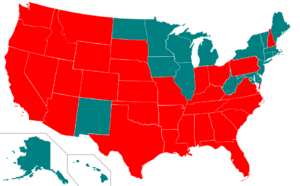Are you safer from violent crime in a place which uses the death penalty?
People who support the death penalty sometimes argues that high rates of crime in a society demand harsh punishment for the sake of law and order. The United States’ federalist system, where states with different laws act as “laboratories of democracy,” gives us a handy set of data for testing this claim. American murder statistics for the period 1990-2015 show something interesting: states which did not enforce capital punishment reported consistently lower rates of homicide than those who executed. Over the fifteen-year period, this difference ranged from 4% to 44% – and the difference widened as the overall murder rate declined. In 2015, Michigan – the first jurisdiction in the English-speaking world to abolish capital punishment in 1846, and a state home to troubled urban centers like Detroit – registered a lower murder rate than 11 states which still enforce the death penalty.
 What’s going on here? When statistics form American states – which are after all members of the same country and comparable in terms of language, culture, economics, and demographics – show us that high execution rates correlate with high murder rates, #WhyExecute in the name of public safety?
What’s going on here? When statistics form American states – which are after all members of the same country and comparable in terms of language, culture, economics, and demographics – show us that high execution rates correlate with high murder rates, #WhyExecute in the name of public safety?
(Source: Death Penalty Information Center)
 My Interrogator Said: You Are An Ass, And Asses Do Not Merit Human Rights
My Interrogator Said: You Are An Ass, And Asses Do Not Merit Human Rights